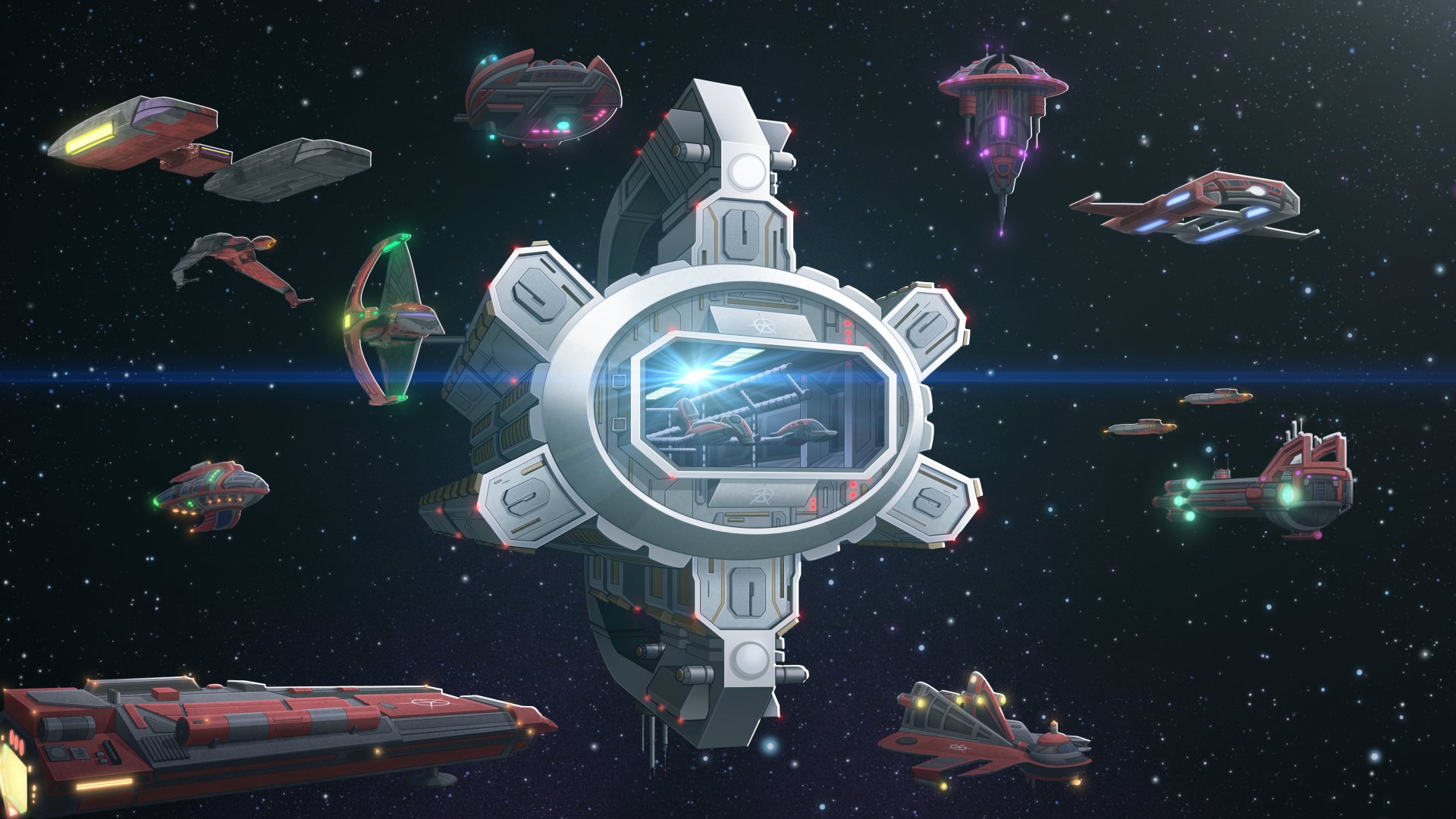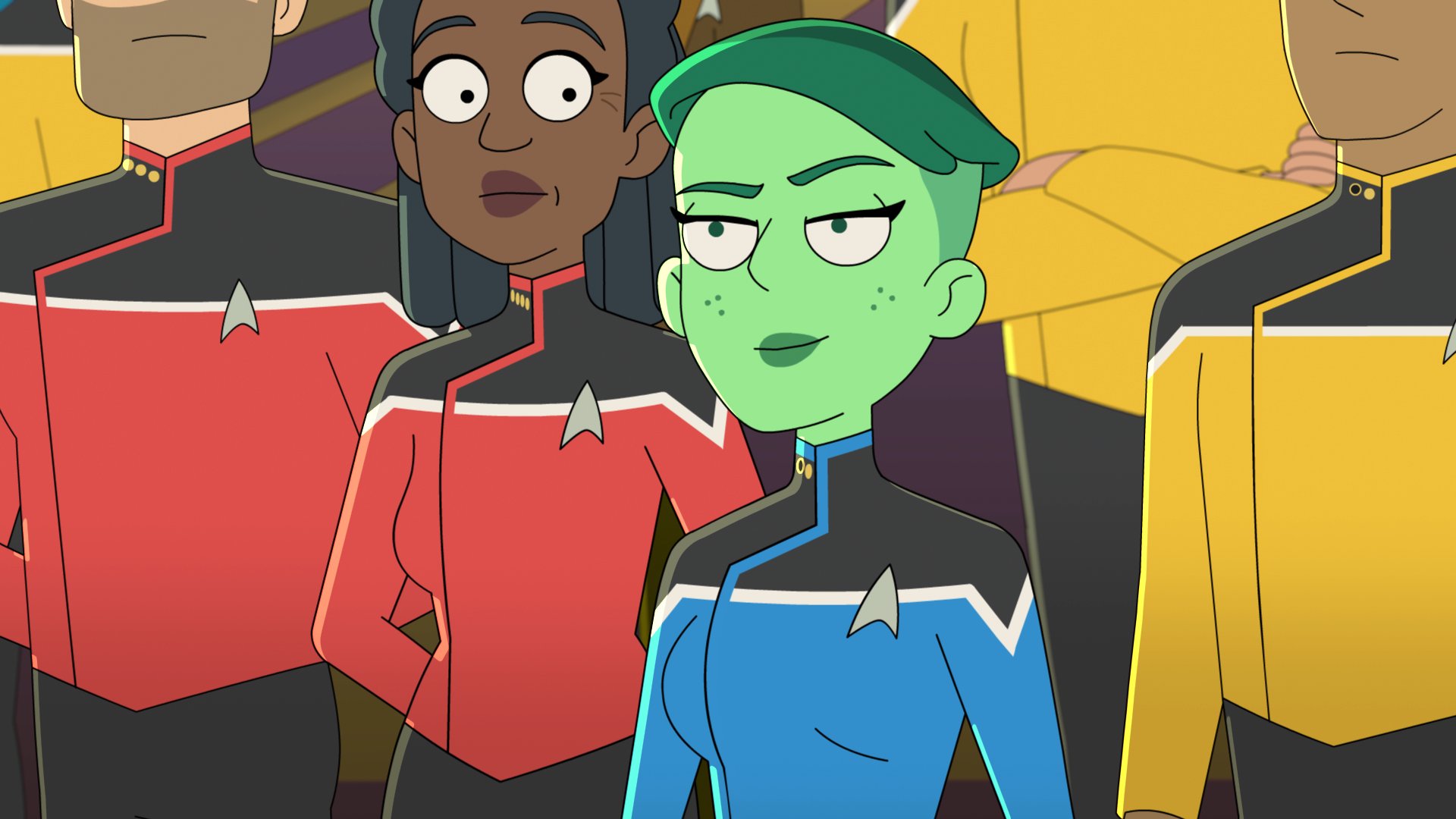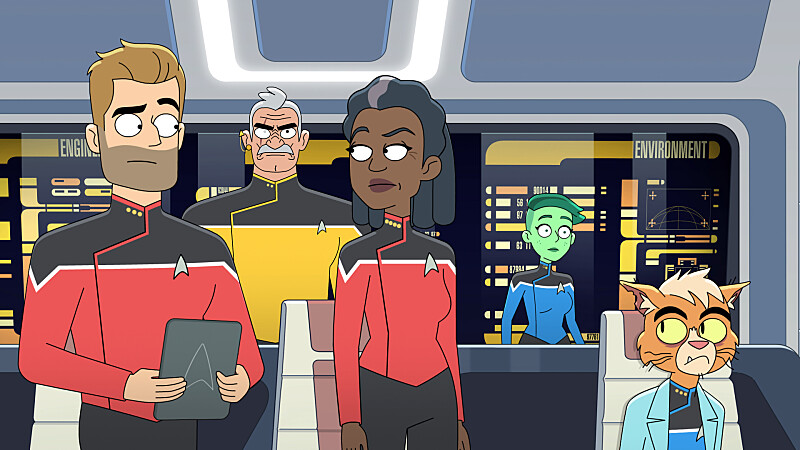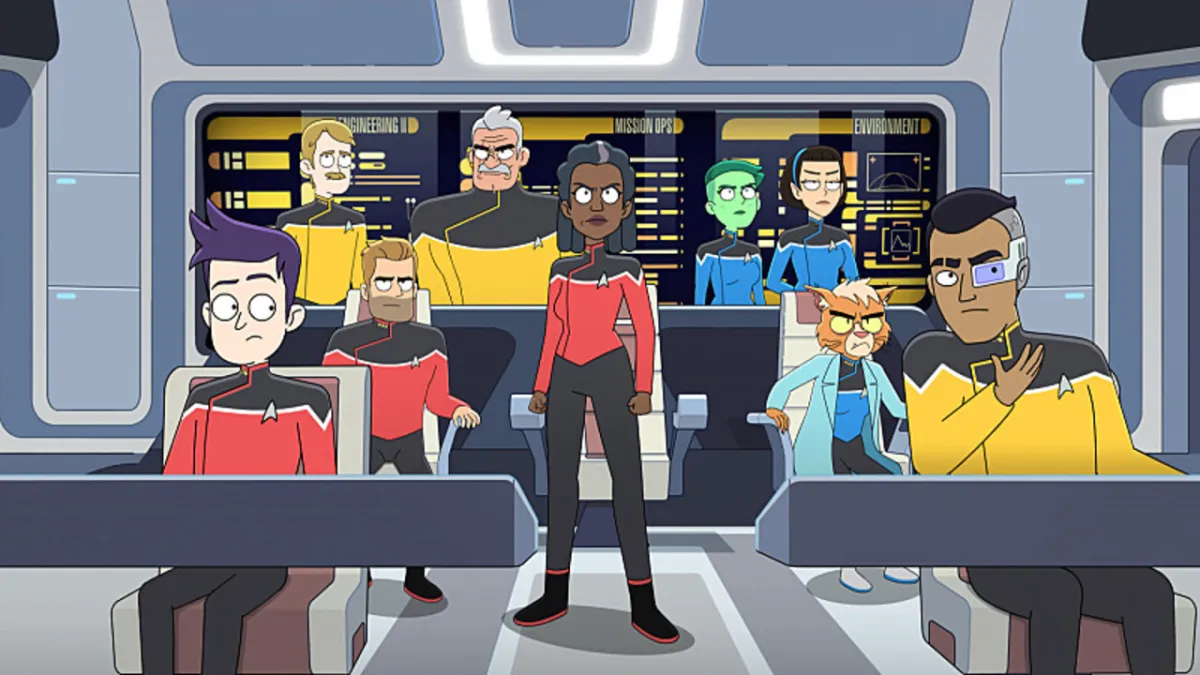This recap of Star Trek: Lower Decks season 4, episode 10 finale, “Old Friends, New Planets,” contains spoilers.
“Old Friends, New Planets” is a disappointing conclusion to an underwhelming season of Star Trek: Lower Decks. As with “The Inner Fight” before it, “Old Friends, New Planets” plays as a mishmash of half-baked ideas that never cohere into anything particularly satisfying.
This is particularly frustrating because there is a germ of a good idea here. At its core, Lower Decks is a show about low-ranked officers on a military spaceship. As such, it is surprising that it has taken the series four full seasons to tell a story about a mutiny. After all, mutinies are evergreen fodder for compelling drama. Users on Paramount+ can hop over to Showtime to stream legendary director William Friedkin’s last film, an adaptation of Herman Wouk’s The Caine Mutiny Court Martial.
Star Trek has told stories about mutinies before. The franchise’s first two-part episode, “The Menagerie,” was a story built around a court martial for Spock (Leonard Nimoy) after he hijacks the Enterprise. Generally, the franchise has used mutinies as a basis for high-concept action thrillers, like Star Trek: Voyager did with “Worst Case Scenario” or “Repression.” Given that most Star Trek shows are built around the captain and the senior staff, their sympathies tend to align with the senior officers.
As such, the basic concept of Lower Decks would lend itself to an interesting inversion of this template. What would a Star Trek story about a mutiny look like if it were told from the perspective of the junior officers? There are arguably shades of this to the first season of Star Trek: Discovery, as Michael Burnham (Sonequa Martin-Green) rebels first against Captain Philippa Georgiou (Michelle Yeoh) and later against Captain Gabriel Lorca (Jason Isaacs), but that drama is largely character-focused.
“Old Friends, New Planets” begins with an interesting premise. What would happen if these junior officers finally took a stand against their superiors? What if these characters who the franchise often treats as disposable or interchangeable organized? It’s certainly an interesting angle for a season finale broadcast just after the resolution of a writers’ strike and in the midst of an ongoing actors’ strike, particularly considering Lower Decks’ longstanding interest in the politics of labor.

Lower Decks has long been a show about junior staff members threatened by advances in automation or artificial intelligence that would make them redundant. It is a remarkably consistent theme across the show’s four seasons. “Old Friends, New Planets” suggests an interesting companion question. What happens if these characters decide to stand up to those in positions of authority? After all, life isn’t necessarily great for those at the bottom of the chain of command.
Nick Locarno (Robert Duncan McNeill) outlines his case in a broadcast to the Alpha Quadrant. “If you’re tired of risking your life for soulless bureaucratic captains who don’t even know your name, if you fear following the orders of incompetent commanders who failed into seats of power, if you’re stuck on the lower decks, then I invite you to join us on the Detrion System,” he tells the disaffected masses of all the major powers. Broadly speaking, there’s a compelling narrative hook there.
Unfortunately, “Old Friends, New Planets” isn’t even vaguely interested in this idea. This is obvious from the outset. The Star Trek universe has any number of non-aligned planets and guilds that exist outside the established military structures of the major powers. Why does Locarno need a fleet? Why strand all of the senior officers of these ships on one planet instead of holding them in custody as hostages? If Locarno was simply stunning these crews, why did the Che’Ta’ leave floating debris?
“The Nova Fleet” is really just a framework on which “Old Friends, New Planets” can hang a variety of callbacks and action sequences, which feels like a shame. In “The Inner Fight,” Mariner (Tawny Newsome) gave a really moving speech about the death of Sito Jaxa (Shannon Fill) in “Lower Decks.” That tragedy was something that shaped Mariner’s outlook. It also defined Locarno. It brings a lot of emotional heft to the two-parter, lending Mariner’s character arc some real weight.
There is a more interesting and more compelling version of “Old Friends, New Planets” that offers a version of Nick Locarno and “the Nova Fleet” that isn’t so obviously cartoonishly evil, and which generates some actual inner conflict for Mariner. Of course, Mariner already quit Starfleet in “Trusted Sources,” and there’s a worry that having her flirt with the idea of joining the mutineers would retread old ground, but it would also offer some actual character motivation.
After all, Star Trek has told plenty of stories about series regulars who have conflicted relationships with outcasts and outlaws, like Ro Laren’s (Michelle Forbes) arc in “Preemptive Strike” or Miles O’Brien’s (Colm Meaney) relationship with Liam Bilby (Nick Tate) in “Honor Among Thieves.” A better version of “Old Friends, New Planets” might find some measure of sympathy for junior officers who don’t want to end up as anonymous “redshirts,” a trope so ubiquitous in the franchise that Star Trek named it.

It is clear from the outset that Locarno is a raving narcissist who is really just using this grand scheme as a way to nurse his wounded ego following the disgrace of “The First Duty.” He is, as T’Ana (Gillian Vigman) succinctly puts it, “an asshole.” However, the best Star Trek villains have some measure of complexity to them, even if they are complete psychopaths. In “Covenant,” for example, Kira Nerys (Nana Visitor) found some empathy for those followers seduced by Gul Dukat (Marc Alaimo).
There is, after all, some measure of tragedy around Nick Locarno. The character appeared in a single episode of Star Trek: The Next Generation, where he was found guilty of orchestrating a dangerous maneuver that led to the death of Cadet Joshua Albert. He was originally intended to become a series regular on Voyager, where he would have a redemption arc for his sins. However, the character was rewritten as Tom Paris (also McNeill) and so Locarno never got the chance to be redeemed.
There’s a potentially interesting angle there, the story of a character cut adrift in a sea of Star Trek continuity, one rewrite away from complete reinvention. Instead, Mariner is never tempted by Locarno. She sees through Nick Locarno immediately, and – after just eight minutes – the rest of the episode becomes a set of crosscut chase sequences, in which Locarno tries to retrieve the Genesis Device that Mariner stole for him as the Cerritos mounts a rescue mission to recover Mariner.
The result is a jumble of nonsense. The third season of Lower Decks worked so well because its elements built organically to the finale, “The Stars at Night.” That closing episode felt like a satisfying payoff. In contrast, “Old Friends, New Planets” breezes through clumsy references to earlier episodes in the season in a way that feels like a decidedly haphazard game of mad-libs. “Old Friends, New Planets” bounces from reference to homage to in-joke, seemingly at random.
Rutherford’s (Eugene Cordero) rivalry with Livik (Nolan North) recurs from “I Have No Bones, Yet I Must Flee.” This disagreement is resolved by “Twaining,” the practice of going to the holodeck in character as Mark Twain, as demonstrated in “Something Borrowed, Something Green.” Speaking of that episode, Tendi (Noël Wells) is forced to confront her sister D’Erika (Ariel Winter) on Orion. The Genesis Device that appeared briefly in “Parth Ferengi’s Heart Place” becomes a key plot point.

“Old Friends, New Planets” has a lot of “remember when…?” plotting. It also doesn’t follow any clear arc or structure, which includes a strange diversion during which Migleemo (Paul F. Tompkins) undergoes “barter by combat.” There are also no real stakes for either Starfleet or the Nova Fleet. From Starfleet’s point of view, Locarno is using the Genesis Device as a deterrent in an uninhabited system. From Locarno’s point of view, as the Ferengi point out, he already has “the Trynar Shield.”
Beyond that, the “Trynar Shield” that encloses the Detrion System makes the chase sequence with Mariner feel largely pointless. She cannot leave the system, so it’s really only a matter of time before Locarno finds her. More than that, given how rare Genesis Devices are, why doesn’t Mariner just immediately detonate it in the void of space? “Old Friends, New Planets” suggests that the episode knows that Locarno’s obsession with the Genesis Device is irrational, but it still feels like lazy plotting.
This may sound like nitpicking, and it kind of is. However, it’s a serious problem with “Old Friends, New Planets” that there’s really nothing to do with the episode except pick nits. “Old Friends, New Planets” is just a bunch of stuff happening, so it’s a problem that none of that stuff is particularly compelling or coherent. The episode seems to suggest that it’s enough to give the audience “Acting Captain Bradward Boimler” (Jack Quaid) without actually doing anything with that image.
“Old Friends, New Planets” brings back actor Shannon Fill to reprise her role as Sito Jaxa. In doing so, it ties Lower Decks to the Next Generation episode of the same name. More than that, its first line of dialogue is given to Joshua Albert, the cadet who died off-screen to spur the plot of “The First Duty.” As a result, there’s an emotional weight baked into “Old Friends, New Planets” that the episode does nothing to justify or pay off. It is frustrating because Lower Decks is usually better than this.
As a result, the biggest emotional beat of the episode – Tendi’s departure – feels completely hollow. Tendi gave up her position on the Cerritos for a bunch of nonsense with no real stakes. This should be a big moment — a series regular potentially departing the show. However, it ultimately just feels like another thing happening in the jumble of the narrative. Those final scenes don’t resonate because this isn’t a story about Tendi. Ultimately, this isn’t a story about anything.






Published: Nov 2, 2023 09:00 am